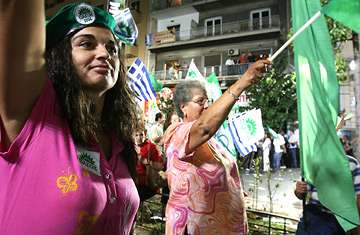
Socialist supporters attend party leader George Papandreou's main pre-election rally in central Athens
For months, Maria Protou, an 18-year-old bleached-blonde philosophy student, was looking forward to her maiden trip to the ballot box this Sunday. But then, a Greek tragedy transpired. Hellish blazes tore through forests parched by two months of intense heat this August, destroying thousands of acres of farmland, killing at least 65 people, and throwing the government's reflexes — and political fortunes — into question. Today, on the eve of the election, Prappa considers skipping the vote entirely, in protest of the tragedy. "It's either that," she says, "or casting a blank ballot or voting for a small, no-name party. Ultimately, she concedes, "I'll make up my mind on election day."
She's not alone. With an estimated 150,000 Greeks, about 12% of the country's electorate, undecided ahead of Sunday's parliamentary elections and with a legal ban on opinion polling in the last fortnight of the campaign, ruling conservatives and rival socialists appear to be locked in one of the toughest election standoffs in recent history. A flurry of opinion polls published before the blackout showed the conservative New Democracy party had a slight lead against PASOK, the socialist party that incumbent Prime Minister Kostas Karamanlis toppled in 2004, ending more than two decades of almost uninterrupted socialist rule. What's more, the August 31 surveys showed that neither of the two major parties had polled over 40%, raising concern among pundits, pollsters and analysts that Sunday's winner may either have to share power with a smaller party or govern with a flimsy mandate. For the reform-minded Karamanlis, a sharp reduction in his party's parliamentary majority may hobble implementation of key economic and social reforms, including the sell-off of ailing state enterprising and revamping of the nation's moribund social security system. "In that scenario," says Anthony Livanios, head of AlphaMetrics, an Athens-based polling agency, "even one lawmaker can hold enormous influence over decision making."
Karamanlis, 51, the scion of a Greek political dynasty that has dominated this country's politics for half a century, rose to power promising to clean up crooked finances and public life. In the wake of a bond-trading scandal that embroiled his government in allegations of corruption, however, Karamanlis in August called for elections six months ahead of schedule, hoping to win a fresh mandate. Since then, attempts by his opponents to ride on Greece's wave of discontent have gained little political traction for PASOK, whose mild-mannered leader George Papandreou has failed to lure leftist voters with his thumping criticism and negative campaigning.
Benefiting from the backlash against Greece's two main parties, the far-right Popular Orthodox Rally (LAOS) party is expected to break the three percent threshold needed to enter the country's 300-seat parliament. Georgios Karatzaferis founded the LAOS after Karamanlis expelled him from the New Democracy party for his extreme views. A 2005 U.S. State Department report on anti-Semitism cited Karatzaferis as "regularly attributing negative events involving Greece to Jewish plots. He denounced politicians with Jewish origins and claims that Jews were behind the Sept. 11 attacks." The party has attracted droves of voters, however, though many of them seem more interested in using the party to lodge a protest vote against the larger two parties than actually support the LAOS's controversial views.
With campaigning intensifying and public anger over the fires fading, Karamanlis has gone on the offensive, ordering quick handouts of more than $4000 to fire victims and pledging a raft of measures, including higher pensions and tax breaks, in an attempt to entice disgruntled conservatives back to the party fold. He has also threatened to take Greeks on a fresh trip to the polls if his New Democracy party fails to win an outright majority. "I understand there is bitterness," Karamanlis told an election rally in northern Greece. "But this in not the time for a negative vote." A non-majority winner in Sunday's polls, he warned, would create a "political impasse" and "paralysis" for the country.
Under a new proportional electoral system, a slim victory with less than 1.5 percentage points between the two main parties can deprive the winner of an outright majority in parliament. On Wednesday, a host of independent pollsters conducting secret tracking polls said the Prime Minister's threat of political uncertainty in addition to his crisis management after the fires had boosted his approval ratings — a claim denied by socialists, who said that both parties were locked in a "dead even" race.
Even so, Greece's looming political uncertainty has precipitated calls for a grand alliance between the country's perennial political foes. "Frustrated voters cultivate romantic notions," a senior pollster said on condition of anonymity because of the polling ban. On Sunday he said, "most voters will sober up before the ballot box and pick the best of the unfavourable choices before them." Provided, of course, they show up.
